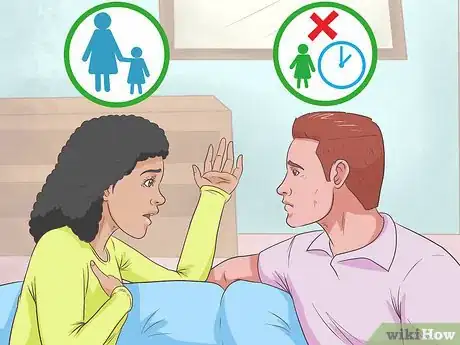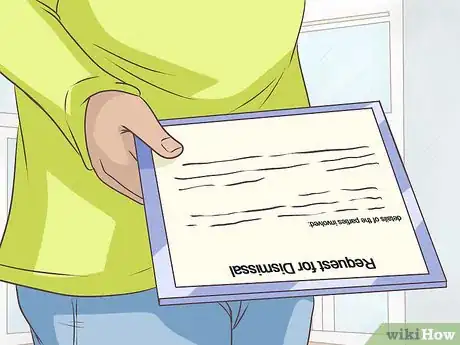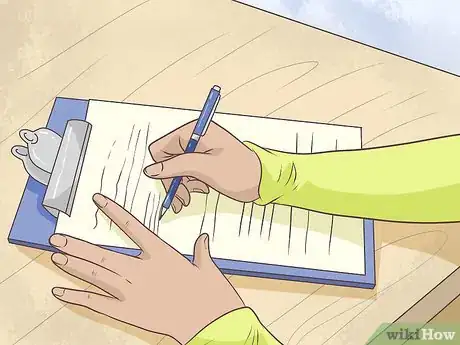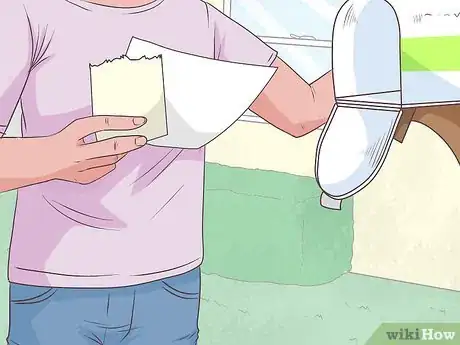This article was co-authored by Luis Congdon. Luis is a Relationship Coach, specializing in helping couples who want a long and happy relationship together. Luis has worked in one of the United States' largest research studies on marital longevity using the framework of Drs. John & Julie Gottman. As a researcher on marital happiness and a relationship coach, Luis has worked with over 1,000 couples, written for the Gottman Institute, spoken at colleges and universities across the United States, been featured in Forbes magazine, and has led over 150 relationship-building classes.
There are 11 references cited in this article, which can be found at the bottom of the page.
This article has been viewed 14,146 times.
Divorce is a complex, difficult process for everyone involved. If you're trying to save your marriage, have patience, and communicate with your spouse honestly and constructively. If you've filed for divorce and want to stop proceedings, the process is easy, as long as the divorce isn't finalized. Things may be tough now but, above all, remember everything will be okay in the long run!
Steps
Resolving Your Differences
-
1Make a list of the issues that you and your spouse need to address. Tell each other what needs to change in order for your marriage to work. Set specific goals and put them in writing. Be sure to come up with positive, constructive goals instead of just calling out each other's faults.[1]
- Make a pact to communicate openly, to listen to each other, and to avoid letting tempers flare. Use “I statements” to avoid coming off as aggressive, especially when you discuss sensitive issues.[2]
- For example, “I feel that the bulk of childcare falls on me, and I'm overwhelmed. I could use more help with the kids,” expresses your needs without launching an attack. “You don't spend any time with the kids and I'm sick of having to do everything,” just delivers criticism.[3]
- Be honest and transparent with your partner about issues that should be addressed within the marriage. He or she may not know exactly what the issue is but they can feel that disconnection or that lack of harmony within the relationship.[4]
- Try to see things from your partner's point of view. Remember, no one is perfect. You both have strengths and weaknesses, and you can each make improvements to be better partners.
-
2Focus on self-improvement instead of assigning blame. Once you and your partner have come up with ideas for saving your marriage, take concrete steps toward those goals. Rather than being critical with each other, set a constructive, positive tone. Concentrate on what you need to do to make your marriage work instead of concentrating on your partner's progress.[5]
- For instance, if you agreed to show your partner more affection, tell them they look nice, ask them how their day was, thank them often, and hold their hand while you watch a movie together. Focus on these efforts instead of just waiting for signs of progress on their part.
- Constantly watching over someone's shoulder or calling out their lack of progress can make them feel isolated and attacked. Make an agreement with your spouse to focus on your own individual progress and support each other through the process.
- If you do feel like you're making more of an effort, try to bring up your concerns without going on the offensive. Say, for example, “I see that you've been making an effort, but my concern is it's not going far enough. Maybe we can take bigger steps to meet each other in the middle.”
Advertisement -
3Do exciting or romantic activities together regularly. Try going on weekly dates or take on a fun new hobby together. For instance, set a regular date night and try a new restaurant each week. You could also pursue a shared interest, such as gardening or hiking.[6]
- In addition to spending time together 1-on-1, go on regular family outings with your kids, if you have any. You could go on family bike rides, play sports at the park, or even just go out for ice cream together.
- Having fun together can help you and your spouse rebuild your bond and mix up your routine. Do your best to keep things fresh and learn to enjoy each other's company.
-
4Try to become more intimate with each other. Being intimate can be a sensitive topic when you're working through marriage issues. Take things one step at a time, and remember that intimacy doesn't necessarily have to be physical. Try having a meaningful conversation or listening to music together.[7]
- As you get more comfortable being with each other, try to become more physically intimate. Show each other affection by giving each other back rubs, holding hands, hugging, and kissing.[8]
- Try to have good thoughts about your spouse within your mind and your heart, this will allow you to form a deeper connection so that you can get to know each other on a more intimate level.[9]
Tip: Appearance isn't everything, but it does play a part in keeping a marriage fresh. Getting more active and eating healthy, a new haircut, or wardrobe upgrades could help you and your partner renew your spark. Looking your best can also help you feel good about yourself inside and out![10]
-
5Keep your stress levels in check. Your relationship can suffer if you and your spouse are stressed out all of the time. Try to avoid taking on too many commitments, and set aside time for relaxing activities, such as reading, meditating, or taking a hot bath.[11]
- When you're stressed out in the moment, take deep breaths and visualize calming scenery. Keep breathing slowly until you start to feel better.
- Finances, kids, and other aspects of marriage can feel overwhelming. Talk to your spouse about dividing parental duties, managing your money, and handling other stressful practical matters.
- Discussing stressful stuff at weekly “business” meeting could help your day-to-day interactions with your spouse more enjoyable.
-
6Address deal-breakers, such as cheating or addiction. While preventing divorce often takes a lot of compromise, issues like adultery and drug or alcohol abuse are pretty black and white. For major issues, your partner (or you) must take concrete steps to address the problem. If your spouse has an addiction, for example, you may require them to enter a recovery program in order to save your marriage.[12]
- Issues like cheating and addiction are hard to deal with on your own, so it's best to get help from a couples counselor in these situations.
-
7See a couples counselor. Don't think of couples counseling as a sign that there's something wrong with you, you partner, or your marriage. Instead, see it as a sign that you and your partner are willing to put forth the effort it'll take to get your marriage back on track.[13]
- You and your partner may attend both joint and individual sessions. The counselor can help you figure out the issues at the root of your conflict and offer strategies for overcoming them.
- As difficult as it is, sometimes divorce really is the better option for everyone involved. A counselor may also be able to help you figure out if ending the marriage is best for you, your partner, and your children, if you have any.
Stopping Divorce Proceedings after Filing
-
1File a request for dismissal form before your divorce is finalized. While exact steps vary by state and nation, you can generally file for dismissal and stop proceedings, provided the divorce isn't finalized. Head to the courthouse where you filed for divorce and ask for the clerk in charge of family law matters. Tell them you'd like to stop your divorce proceedings, and ask for a “Request for dismissal” or “Motion for Dismissal” form.[14]
- The marriage is officially dissolved once the divorce is finalized. If it's finalized but you want to “undo” the divorce, you and your partner would need to remarry.
Keep in Mind: You can only file a request for dismissal if you're the one who filed for divorce. Generally, if one partner filed for divorce, the other can't stop the process on their own.[15]
-
2Fill out the form according to the clerk's instructions. Have your original divorce filing forms and your case number handy, and enter your information into the appropriate boxes. Forms vary but, in general, you'll need to enter your name and personal information, your partner's information, and the case number of your original divorce filing.[16]
- The clerk will let you know where to check boxes, such as “Family Law” or “Dissolution.” You may also need to write a reason for the dismissal motion, such as “Parties have reconciled.”
- Your local court system may post motion for dismissal forms on their website's divorce or family law section, and you may be able to file by mail. However, it's wise to file at the courthouse in person. That way, a clerk can ensure you choose the right form and help you fill it out correctly.
-
3Serve your partner with the dismissal if your jurisdiction requires it. Depending on your location, you may need to send the dismissal form to your partner. You can either send it by certified mail or give it to them in person. The served partner usually doesn't need to do anything in response.[17]
- In some jurisdictions, your partner may need to sign the dismissal. They can go to the courthouse when you file and sign in person or send a signed copy to the court via certified mail.[18]
- Since you're stopping divorce proceedings, there's a good chance you're on good terms with your spouse. With that in mind, and the fact that the most they'll need to do is sign a form, there's no need to have a sheriff or third party serve the dismissal motion.[19]
-
4Attend a hearing if you need to get a judge's signature. In many cases, filing the motion for dismissal is all it takes to stop divorce proceedings. However, ask the court clerk about specific steps for your jurisdiction. If necessary, head back to the courthouse to get a judge to sign your form and finalize your motion.[20]
- You'll either find out when the hearing is scheduled when you file your form or by mail. Go to the courthouse at the scheduled date and time, and wait for your name to be called.
- When you're called, the judge may ask you questions about your reconciliation. Be sure to respond honestly and respectfully.
- If you're the one who filed for the divorce and the dismissal, your partner may not need to attend the hearing. However, it's helpful if they're available to answer questions and tell the judge they also want to dismiss your divorce case.
Expert Q&A
-
QuestionWhat can you say to stop a divorce?
 Luis CongdonLuis is a Relationship Coach, specializing in helping couples who want a long and happy relationship together. Luis has worked in one of the United States' largest research studies on marital longevity using the framework of Drs. John & Julie Gottman. As a researcher on marital happiness and a relationship coach, Luis has worked with over 1,000 couples, written for the Gottman Institute, spoken at colleges and universities across the United States, been featured in Forbes magazine, and has led over 150 relationship-building classes.
Luis CongdonLuis is a Relationship Coach, specializing in helping couples who want a long and happy relationship together. Luis has worked in one of the United States' largest research studies on marital longevity using the framework of Drs. John & Julie Gottman. As a researcher on marital happiness and a relationship coach, Luis has worked with over 1,000 couples, written for the Gottman Institute, spoken at colleges and universities across the United States, been featured in Forbes magazine, and has led over 150 relationship-building classes.
Relationship Coach There is no "one thing" or magic bullet that can instantly save your marriage. Saving your relationship and stopping a divorce requires a lot of hard work.
There is no "one thing" or magic bullet that can instantly save your marriage. Saving your relationship and stopping a divorce requires a lot of hard work. -
QuestionHow do you revive a failing marriage?
 Luis CongdonLuis is a Relationship Coach, specializing in helping couples who want a long and happy relationship together. Luis has worked in one of the United States' largest research studies on marital longevity using the framework of Drs. John & Julie Gottman. As a researcher on marital happiness and a relationship coach, Luis has worked with over 1,000 couples, written for the Gottman Institute, spoken at colleges and universities across the United States, been featured in Forbes magazine, and has led over 150 relationship-building classes.
Luis CongdonLuis is a Relationship Coach, specializing in helping couples who want a long and happy relationship together. Luis has worked in one of the United States' largest research studies on marital longevity using the framework of Drs. John & Julie Gottman. As a researcher on marital happiness and a relationship coach, Luis has worked with over 1,000 couples, written for the Gottman Institute, spoken at colleges and universities across the United States, been featured in Forbes magazine, and has led over 150 relationship-building classes.
Relationship Coach Focus on understanding and empathizing with your partner's perspective. When both parties do this, a marriage can definitely turn the corner.
Focus on understanding and empathizing with your partner's perspective. When both parties do this, a marriage can definitely turn the corner. -
QuestionHow do I stop my husbands relatives from encouraging him to get a divorce?
 Andimaxx1955Community AnswerNo one can make anyone get a divorce if they don't want to. If your husband's relatives are getting between the two of you, you need to sit down and find out why.
Andimaxx1955Community AnswerNo one can make anyone get a divorce if they don't want to. If your husband's relatives are getting between the two of you, you need to sit down and find out why.
References
- ↑ https://www.nytimes.com/2017/05/18/fashion/weddings/11-questions-to-ask-before-getting-a-divorce.html
- ↑ Luis Congdon. Relationship Coach. Expert Interview. 3 September 2021.
- ↑ https://www.apa.org/monitor/2013/04/marriage
- ↑ Luis Congdon. Relationship Coach. Expert Interview. 3 September 2021.
- ↑ https://www.psychologytoday.com/us/blog/resolution-not-conflict/201303/marriage-problems-heres-8-step-rescue-plan
- ↑ https://www.apa.org/monitor/2013/04/marriage
- ↑ https://www.apa.org/monitor/2013/04/marriage
- ↑ https://www.psychologytoday.com/us/blog/if-you-re-in-my-office-it-s-already-too-late/201803/five-ways-divorce-proof-your-marriage
- ↑ Luis Congdon. Relationship Coach. Expert Interview. 3 September 2021.
- ↑ https://www.psychologytoday.com/us/blog/resolution-not-conflict/201311/7-strong-steps-stop-divorce
- ↑ https://www.apa.org/monitor/2013/04/marriage
- ↑ https://www.ncbi.nlm.nih.gov/pmc/articles/PMC4012696/
- ↑ https://www.psychologytoday.com/us/blog/resolution-not-conflict/201311/7-strong-steps-stop-divorce
- ↑ https://www.gov.uk/divorce/apply-for-decree-nisi?step-by-step-nav=84b7fdca-a8b0-4500-bc27-dafeab9f1401
- ↑ https://www.courts.ca.gov/1231.htm
- ↑ https://www.courts.ca.gov/1231.htm
- ↑ https://www.saccourt.ca.gov/family/docs/fl-case-dismissal-instructions.pdf
- ↑ https://www.washingtonlawhelp.org/files/C9D2EA3F-0350-D9AF-ACAE-BF37E9BC9FFA/attachments/392736AF-E537-D597-3214-F8E7FA2EB013/3219en.pdf
- ↑ https://www.saccourt.ca.gov/family/docs/fl-case-dismissal-instructions.pdf
- ↑ https://www.washingtonlawhelp.org/files/C9D2EA3F-0350-D9AF-ACAE-BF37E9BC9FFA/attachments/392736AF-E537-D597-3214-F8E7FA2EB013/3219en.pdf
About This Article
To stop your divorce, make a list of issues that you and your spouse need to address. Once you have a list of improvements you want to make, present them to your partner and tell them that you want to try to make your marriage work. If your partner is on board, try to rekindle your spark by going on dates or starting a new hobby together. When you address issues, focus on solutions you can work towards together instead of blaming each other. If your divorce has not yet been finalized, file a request for dismissal with the court to cancel your separation. For more tips, including how to save your marriage through couples counselling, read on!






































































